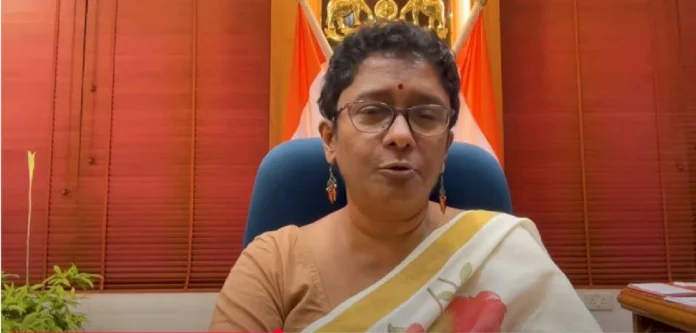By Kumkum Chadha
To call her a victim would be an insult to her strength. She is an accomplished civil servant with a career that many would envy. Sarada Muraleedharan, Kerala’s chief secretary, has held positions of extraordinary responsibility, from heading the transformative Kudumbashree Mission to serving as COO of the National Rural Livelihoods Mission under the Ministry of Rural Development, Joint Secretary in the Ministry of Panchayati Raj, and District Collector of Trivandrum.
But for all her professional accolades, it is a recent moment of deeply personal reflection that has stirred a national debate.
Muraleedharan succeeded her husband, V Venu, as chief secretary of Kerala—marking a first in the administrative history of the state. But it wasn’t the handover that sparked controversy. Rather, it was a Facebook post comparing her performance unfavourably to his. “An unexpected comparison,” she said, “on my stewardship as Chief Secretary—that it is as black as my husband’s was white.” That comment—meant figuratively—cut deep. And Muraleedharan didn’t let it pass.
“There is an expectation that the wife will be a continuation of the husband, which is not always the case,” she said in an interview.
“We are two different people with different working styles. My husband looks for quick solutions; I dig deep and look at the larger picture. His meetings last half an hour, mine go beyond five hours. He networks with ease, I prefer one-on-one engagements.” What rattled her wasn’t just the comparison—it was the stark symbolism.
“This meant that his work was good and mine was not; that his created well-being and mine, misery. That I was strict and regimented—but why was all this being labelled black?” she asked. “This set me thinking and I felt that the comment had to be called out,” she said.
And so she did. In doing so, Sarada, the bureaucrat, became a reluctant icon in the fight against colourism—a conversation rarely broached in India’s corridors of power. “I felt it was time to own my blackness; to own who we are and stop being defensive or apologetic,” she said. “It is time to understand that there is beauty—it’s just a different kind. Being fair does not define beauty. Even we who are dark can be beautiful,” she added. For someone who has occupied rooms of influence, such honesty is rare.
“The issue of colour and gender are not things you set aside when you enter service. They stay with you. I cannot not be a woman. I cannot not be dark.”
She spoke of an armour built over time—one that deflects whispers, stares, and judgements. “Service gives you some kind of protection, but this does not mean you don’t hear the innuendo. You learn to navigate it. Our work speaks eventually. But that doesn’t mean the problem goes away. I realized I was not good enough. That I was not the right colour.”
The wound is still raw—it began in childhood. She recalls being just four when she asked her mother: “Would you put me back in your womb and bring me out again, all fair and pretty?” She even asked her aunt what soap she used to look so fair.
“It is a battle one fights internally. We all have demons. Sometimes we understand them, sometimes we don’t. Sometimes we win, sometimes we lose.”
Sarada’s story underscores what scholars have termed “colourism,” a form of discrimination distinct from racism but equally damaging. In her view, it intersects heavily with gender.
“The intersection of colour and gender is tougher on women than on men. Society tends to homogenise who we are—to believe that we must fit into a mould. Blackness is often seen as inferior, and that works at multiple levels.”
Born of an inter-caste marriage, she says her identity has always been ambiguous: “With a complex childhood, I myself do not know where I belong. I’ve never disclosed my caste.” Colourism, she argues, is also profession-specific.
“There are professions where colour is critical because the perception of a positive personality is linked to fair skin. In many fields, skin tone is a deciding factor even for entry. But that does not mean any profession is immune.”
Her journey—from a child yearning to be born again “fair and pretty” to a woman who has reclaimed her identity—has not been easy. “The journey has been long, challenging and agonizing. But I have come to terms with it. I want to own and celebrate my blackness,” she said.
She knows the debate she has triggered may not follow a linear path. But she hopes it continues. “Maybe not in a straight line, but it will. And I’m happy to be the trigger.”
Yet, it has taken a toll.
“Have I been upset? Yes. Was I anxious? Yes. Did I worry? Yes. Were my insides eaten away? Yes. But did I cry? I do not remember.”
Perhaps she did. Perhaps she didn’t. What is certain is this: her being is scarred, her soul charred—yet she has risen. Again.
—The writer is an author, journalist and political commentator


